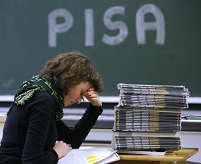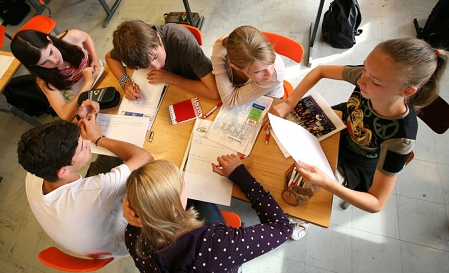Erstellt am: 20. 1. 2012 - 18:50 Uhr
Get Better
It’s easy to get bogged down in the minutiae of national education policy - the PISA test, class size, school forms, teacher training to name but a few of the issues - and forget what we are really trying to achieve inside our schools. This Saturday’s Reality Check special comes from the Salzburg Global Seminar at Schloss Leopoldskron, where experts from five continents discussed the idealist goals that should drive education policy in the future.

APA / Robert Jäger
Basically that means preparing future generations to cope with a labour market that is demanding ever greater specialisation. Veronica Boix Mansilla, an Argentina-born teacher, points out that the integration of economies around the world means the very nature of work is changing at an unprecedented rate: "People who know how to think like experts and how to collaborate will be able to get jobs that pay good salaries. People who are trained to do routine, repetitive work will probably not find jobs, or if they do, those jobs will be very badly paid."
"Skills is the single word that really dominates education debate", agrees John Lotherington , the director of the 21st Century Trust in London. In Europe it seems we have been failing. Our education system has let too many young people fall though the net and has left too many young, unskilled Europeans unemployed and, some say, unemployable. That has to be remedied says Lotherington. "It’s about the knowledge society, it’s about globalization, it’s the need to skill up a work-force so that everyone has a great life chance."
A Brave New World The "future leaders" of a multi-ethnic USA meet in a Salzburg castle.
The idea of schools as a nursery for employment is often misunderstood. We are not talking about creating cogs in a dollar-driven machine: this economic concern is pivotal to social cohesion. Obviously a society where more people find their place and feel valued is bound to be a more harmonious society, whereas a society in which large sections are left unemployed and disenfranchised is bound to be an angry one. But, beyond this, good education can do much to foster a less conflict-ridden world. "Education should help us to become a more tolerant and diverse society," says a Michael Nettles, Professor of Education at the University of Michigan, "where people actively understand and respect human life, where they respect the variety and nature of our society."
As the world economy goes through momentous and sometimes tumultuous changes, there have also been, of course, momentous changes in the makeup of our society. Economic migration has spawned xenophobia, racism and political polarisation. Our schools have to prepare the coming generations to deal with those changes better than we have done: "Our classrooms are more diverse, our cities are more diverse," says Boix Mansilla, "and we need to learn how to live with one another in a world that is changing in front of our very eyes."
Schools are about interacting with other people in the most fruitful way possible, agrees Lotherington, "They are basically about social cohesion." And the good news, he says, is that young children are naturally open-minded and curious. Scientific research has shown that acceptance of differences comes naturally to them, so if this can be nurtured in diverse classrooms from the very beginning of education, future generations might succeed where we have failed.

APA / Helmut Fohringer
This is where good teachers come in. Many adults nowadays remember being humiliated during their school days. If you feel like a failure or an outcast at school, then it is quite likely that you will feel like a failure and outcast in society. A teacher who employs sarcasm against a struggling pupil is, I would suggest, actively encouraging his or her classmates to ridicule weaknesses. The groundwork for a more empathic society can be achieved at school and that requires engaged teachers.
Most experts agree that it is vital to improve the standing of the teaching profession. Finland`s education system is broadly admired; over the past ten years in international comparison Finnish 15-year olds have consistently displayed some of the highest standards in reading, maths and science. Many link this to the fact that teaching is a prestigious occupation in Finland. Teachers are seen as real community leaders and it is as hard to gain a place on a teaching training course as it is for them to get into law school or medical school. In Austria there is currently a teacher shortage, which is being partly combatted by a new initiative called Teach for Austria, in which highly qualified graduates are encouraged to spend two years teaching and learning about teaching in schools in the least socially privileged districts in Austria.
The education experts at the seminar in Salzburg think that the big political issues of the future must be incorporated into the school curriculum. Boix Mansilla thinks we should take a careful look at the sort of challenges future generations are likely to face, including dealing with increasing migration and the rapid destruction of the environment, and shape our curriculum around it. Only then will it be possible to nurture a generation which is able to work together towards finding solutions. Lotherington says a vital issue like sustainability is impossible to ignore in schools.
That makes sense but it is a tightrope walk: school pupils are impressionable and there is a danger that a teacher could indoctrinate them with his or her own personal view of the world. This is particularly true in the United States, where issues like man-made climate change remain contentious. "Teachers have to understand and value the concept of neutrality," says Nettles.
John Lotherington says instilling sense of autonomy in young people is the key aspect. The aim is not to teach them what to think but how to think. Pupils should be introduced to the major debates and the teachers should explain the different stand-points and encourage them to make up their own minds. "It’s about equipping the child to go out into the world. We want to skill them up in such a way that will bring them a good job that will bring them their livelihood and will help them take part in their communities but will also teach them the values to wish to take part in their societies."
Dieses Element ist nicht mehr verfügbar


